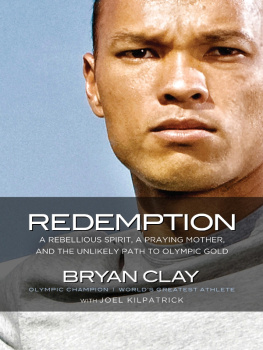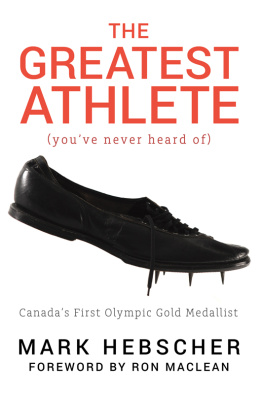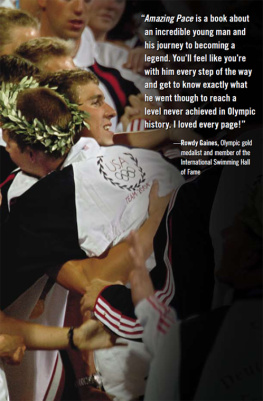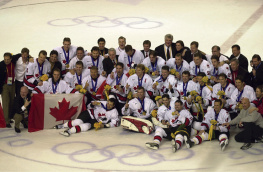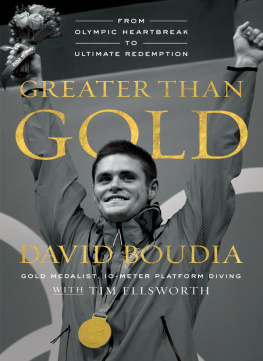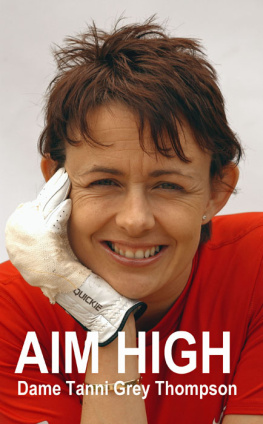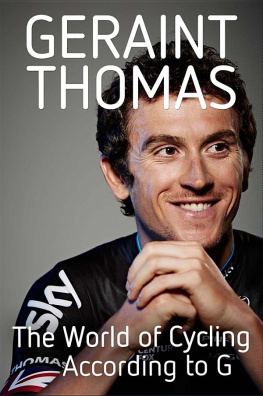GOING FOR GOLD
JOCELYN ANDREWS
Acknowledgements
Thank you to the athletes for sharing their stories.
Thank you to Jamie Baulch and Hannah Hore at Definitive Sports Management; Gayle Howells at Seren PR; and Jane Thomas and Sarah Mogford at Sport Wales for their help.
Foreword
For our Welsh sportsmen and sportswomen the London 2012 Olympics will be the high point of a long and difficult journey. As we follow them in their quest to take on the worlds best athletes, we will marvel at their skills and competitive spirit, developed over many years of dedication and commitment. Just as it did for me, their Olympic dream began with an inspiration which might have come from their mum or dad, an enthusiastic school teacher, local club coach or by watching their heroes on television and wanting to equal their great feats.
For me, it was a chance meeting with Ron Pickering, the National Athletics coach for Wales, which fired my desire to compete in the Olympics. His great ability to guide me as a young athlete, motivate and inspire me to higher levels of training, and support me when things went wrong, played a huge role in helping me to win the gold medal for the long jump at the Tokyo Olympic Games.
In sport, as in life, there are setbacks and hurdles to overcome. Injuries, illness, loss of form and confidence all play their part. The challenge is to keep a clear focus on the goals and stay motivated to achieve them.
In modern sport no one can make the grade by working alone. Champions come from teamwork the support people such as the coach, trainer, sport scientist and medical staff. No stone is left unturned in the pursuit of your dream.
There are many people with natural ability but who lack the commitment needed to spend hours every day honing their skills and fitness levels. The Welsh athletes who will represent us in London 2012 will have paid this price and made the necessary sacrifices. Their reward will be to take part in the greatest sporting event on earth, the Olympic Games. They will join an elite club of people who have reached the top of their sport. We in Wales will follow their progress over the coming months and feel very proud when we watch them take on the best in the world.
Good luck.
Lynn Davies CBE, President UK Athletics, Olympic gold medallist Tokyo 1964
David Dai Greene Hurdler
Technique, tenacity and talent those are the qualities that sum up Dai Greene. A passionate athlete and a passionate Welshman, his focus and determination have taken him to the top. He deserves to succeed. Greene for go! Da iawn, Dai!
Colin Jackson CBE, 1993 and 1999 World Champion 110 metres hurdles
I was at my happiest in school when I was playing sport. I did enjoy my other studies but sport was what I wanted to do. My earliest success was winning the local cross-country race in Llanelli at the age of seven. I only lived five minutes away from school and I ran home shouting, I won! I won! clutching my medal proudly to show my parents, who hadnt expected me to win at all. David Tanner was my headmaster at Penygaer Junior school in Llanelli and he took a keen interest in me and still follows me in competitions now. He could see I had a talent and the desire to do well, and he always challenged me in a good and competitive way and this helped and influenced me as a youngster.
To be fair, all of the teachers knew I loved taking part in sport and noticed early on that I was a good all-rounder. I wanted to be involved in every sport that was open to me. The teachers were very supportive and often stayed behind after school to help with our sporting activities to ensure we were really well prepared when we had competitions. Again, when I went to secondary school, Coedcae in Llanelli, my teachers Mike Walters and Nick Murphy stayed behind after school to work with me, which is a sacrifice they didnt have to make and which I very much appreciate now. My parents didnt shower me with compliments about my sporting successes, but took me wherever I wanted to compete without complaining. They never pushed me into anything, the choice was mine. But I was always keen to get involved and they were keen to help me. They just wanted me to be happy and I think that is a great attitude. It made sport fun and not a chore. As a child you dont think about all that your parents do for you but, looking back on it, they drove miles to a training venue, then hung around waiting for me for several hours and then drove me back. It cant have been much fun for them!
I signed with Swansea City football club at an early age and I enjoyed playing for them for a number of years. Then, sadly, I had one season where I lost confidence. I stopped enjoying football and started to question why I was doing it. My parents were supportive of me and let me join a smaller local team so that I could begin enjoying myself again. They just wanted to see me happy and I decided to turn down the contract in Swansea because it wasnt for me at that time. I loved football but I needed a less forceful approach to get the best out of me. I lacked confidence and I didnt react well to being shouted at. It didnt bring out the best in me. Now I am older I can deal with a strong approach but then I wasnt able to handle it and I performed poorly because of it. It was a vicious circle because the more upset I got, the worse I played and so the best thing was for me to leave. It took me a number of years to get my confidence back but when I did the proof was my success.
Growing up I idolised Ryan Giggs. He played on the left wing and I was naturally right footed, so I taught myself at a very early age to play with my left foot. I practised in the garden dribbling around cricket wickets and I picked it up very quickly and easily. People didnt know which foot I naturally used as I could kick with both feet equally well. It became second nature for me to use both as I had such good control. Later, it really helped when it came to hurdling, as I could use both legs equally well and had excellent coordination. I didnt know then just how much a favour I was doing myself by practising those soccer skills. They were to be a huge help in my later athletics career!
I had always loved athletics in school in the summer months, so when I left football I decided to use the time to train more in my new-found sport, hurdling. Id train twice a week but Id also be out at the weekends having a few drinks with my mates, so I was never really that good at competitions as I wasnt giving a hundred per cent effort. At the age of seventeen I was diagnosed with epilepsy, a condition which my brother also has. I suffered a few seizures but I decided that if I changed my lifestyle and concentrated on my sports, then epilepsy was not going to stop me doing anything. I know my trigger points and I am lucky because my condition is not severe.
When I went to university, at the University of Wales Institute, Cardiff (UWIC), I met people who were as serious about training as I had been when I played football, and they encouraged me to join them in a group that trained every day. I started doing weights with them and as soon as I got involved, I never looked back. All the old desire to do well returned. I hadnt really known what I wanted to do with my life when I went to university. I hadnt wanted to study anything in particular. But when I got there, I rediscovered athletics and remembered how much I loved training. Also, because I had enjoyed a good social life earlier, partying was out of my system. I was able to make the most of college and was motivated by having people around me who wanted to get the most out of their sport and out of their lives. I also met my girlfriend, Sian, at UWIC as she was in the same training group as me.
I studied Sport and Leisure Management and my coach there was Darrell Maynard. I worked with Darrell from 2004 to 2008 and Im still very close to him. Our relationship may be coach and athlete but Im always welcome at his house for Sunday lunch with his family, and he is a very important part of my career. He helped me by example. He showed me how fit he was as a forty-year-old man he trained with the group and often put us to shame! He brought enjoyment and energy to the track every day. He helped me enjoy athletics and acted like a father figure to me when I lived away from home. He helped to finish off and mould me into the person I am today. He was ex-army so he didnt take any nonsense in training, and he commanded respect from us all. He put an ethos of hard work into our training group and thats something thats stuck with me. If I had been with a different coach for those three years at university, I would never have been as successful as I am now. I have a great deal to thank him for.




